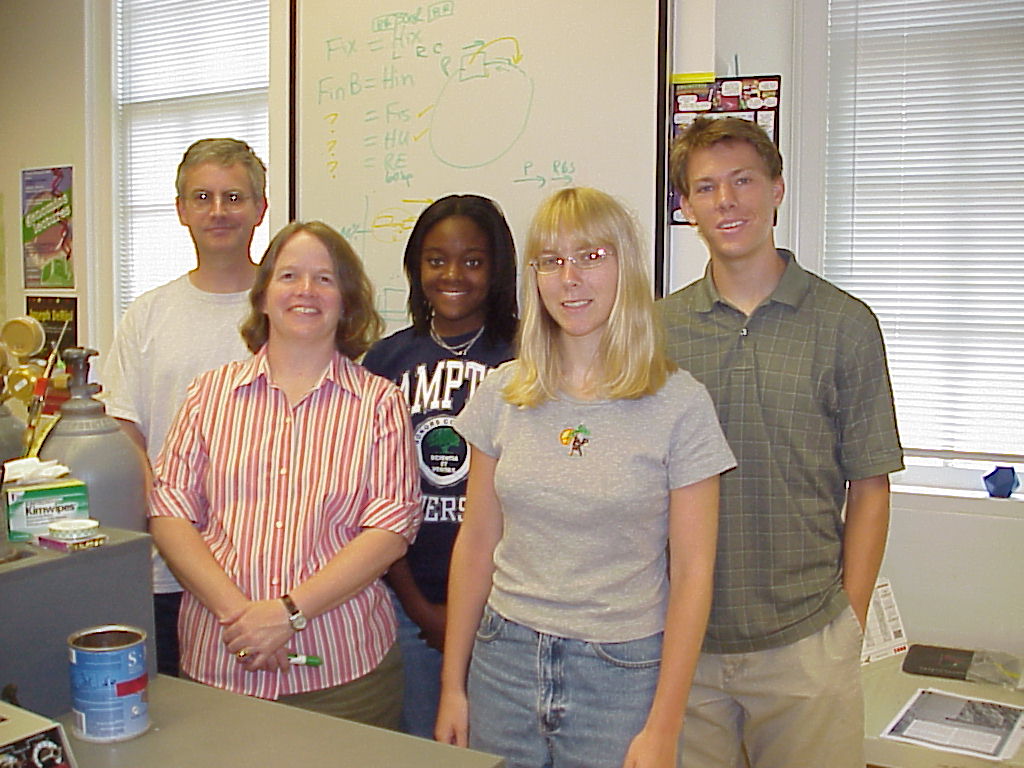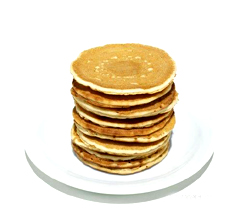Davidson 2006
From 2006.igem.org
Macampbell (Talk | contribs) |
Macampbell (Talk | contribs) |
||
| Line 24: | Line 24: | ||
|[[Image:pancakes.jpg|250px|Pancakes|left]]'''Math''': Signed permutations can be used to represent pancake stacks. For instance, "1, 2, 3" is a stack of three pancakes all in the proper order and orientation. "2, 3, -1" is the same stack, but here, pancake 1 is out of order and in the wrong orientation (burnt side up). <font color='red'>Lance, please work on this section.</font color> | |[[Image:pancakes.jpg|250px|Pancakes|left]]'''Math''': Signed permutations can be used to represent pancake stacks. For instance, "1, 2, 3" is a stack of three pancakes all in the proper order and orientation. "2, 3, -1" is the same stack, but here, pancake 1 is out of order and in the wrong orientation (burnt side up). <font color='red'>Lance, please work on this section.</font color> | ||
|- valign="top" | |- valign="top" | ||
| - | |[[Image:Ehop.jpg|250px|Logo|left]]'''Biology''': To flip fragments of DNA, we have reconstituted the Hin/ Hix invertase system from ''Salmonella typhimurium'' as a BioBrick compatible system in ''E. coli''. We built the recombinational enhancer (RE) and Hin invertase recognition sequence HixC using the genomic sequence of ''S. typhimurium'' | + | |[[Image:Ehop.jpg|250px|Logo|left]]'''Biology''': To flip fragments of DNA, we have reconstituted the Hin/ Hix invertase system from ''Salmonella typhimurium'' as a BioBrick compatible system in ''E. coli''. We built the recombinational enhancer (RE) and Hin invertase recognition sequence HixC using the publicly available genomic sequence of ''S. typhimurium''. Hin invertase was cloned from ''S. typhimurium'', Ames strain TA100. Segments of DNA are flanked by HixC sites to make them invertable. Hin invertase recognizes these sites and inverts the DNA fragment in between with the help of the Fis protein bound to the RE. |
|} | |} | ||
Revision as of 12:41, 18 October 2006
 Project Overview [http://partsregistry.org/cgi/partsdb/pgroup.cgi?pgroup=iGEM2006partsregistry.org/cgi/partsdb/pgroup.cgi?pgroup=iGEM2006&group=Davidson Davidson Parts] Team Members Tools and Resources Check out our [http://www.bio.davidson.edu/courses/synthetic/photos/FlapJack_HotCakes.html Official Team Photo] |
Goal
Our goal is to mathematically model and genetically engineer a biological system that can compute the solution to a puzzle called the burnt pancake problem. Our work was done in collaboration with the [http://2006.igem.org/wiki/index.php/Missouri_Western_State_University_2006 Missouri Western iGEM Team] and an undergraduate research fellow from [http://www.hamptonu.edu/ Hampton University].
The Burnt Pancake Problem: at the Interface of Math and Biology
Our project integrates math and biology using the burnt pancake problem, a puzzle in which a disordered series of units (or stack of pancakes) must be shuffled into the correct order. Every unit, or pancake, must be placed in the proper order (largest on bottom, smallest on top) and in the proper orientation (burnt side down, golden side up). Try this puzzle out for yourself [http://www.cut-the-knot.org/SimpleGames/Flipper.shtml here]. Trial and error is one approach to solving the problem, but how could one compute the quickest solution? Our approach is to model the problem by representing a pancake stack mathematically and biologically.
A stack of pancakes can be represented by a series of integers in a certain order (ie. 1, 2, 3 vs. 3, 2, 1) where orientation is represented by a positive or negative value (1 vs. -1). Similarly, a series of DNA segments has a certain order (ie. promoter, coding region 1, coding region 2) and each unit has two possible orientations (plus strand vs. minus strand).
Approach
| Math: Signed permutations can be used to represent pancake stacks. For instance, "1, 2, 3" is a stack of three pancakes all in the proper order and orientation. "2, 3, -1" is the same stack, but here, pancake 1 is out of order and in the wrong orientation (burnt side up). Lance, please work on this section. |
| Biology: To flip fragments of DNA, we have reconstituted the Hin/ Hix invertase system from Salmonella typhimurium as a BioBrick compatible system in E. coli. We built the recombinational enhancer (RE) and Hin invertase recognition sequence HixC using the publicly available genomic sequence of S. typhimurium. Hin invertase was cloned from S. typhimurium, Ames strain TA100. Segments of DNA are flanked by HixC sites to make them invertable. Hin invertase recognizes these sites and inverts the DNA fragment in between with the help of the Fis protein bound to the RE. |
Methods and Results
Basic parts: Parts used in this project were designed by the [http://partsregistry.org/cgi/partsdb/pgroup.cgi?pgroup=iGEM2006partsregistry.org/cgi/partsdb/pgroup.cgi?pgroup=iGEM2006&group=Davidson Davidson] and [http://partsregistry.org/cgi/partsdb/pgroup.cgi?pgroup=iGEM2006partsregistry.org/cgi/partsdb/pgroup.cgi?pgroup=iGEM2006&group=Missouri Missouri Western] iGEM teams
Modeling
- Modeling the behavior of pancake flipping: deducing kinetics and size biases
- Using modeling to choose which families of unsolved pancake stacks to start with
Building the Bilogical System
- Single pancakes
- The problems of read-through - uncontrolled Tet expression, uncontrolled flipping
- New pSB1A4 vector: insulates, but is not compatible with parts carrying double terminators
- Designing pancakes without TT's
- Two pancake constructs
- Biological equivalence - distinguishing 1,2 from -2,-1 using RFP-RBS, updated panckaes
Conclusions
- Consequences of devices: data storage, possible application for rearranging transgenes in vivo, proof-of-concept for bacterial computers, first in vivo controlled flipping of DNA??
- Next steps: can solve problem but need control over kinetics
- Lessons learned:
- Troubleshooting, communication, teamwork, publicity
- Math and Biology meshed really well and even uncovered a new proof
- Multiple campuses can increase capacity through communication and cooperation
- Size of school is not a limiting factor
- We had a blast and learned heaps
Students
- Sabriya Rosemond is a rising junior biology major at Hampton University.
- Erin Zwack is a rising junior biology major at Davidson College.
- Lance Harden is a rising sophomore math major at Davidson College.
- Samantha Simpson is a rising sophomore at Davidson College who might design a major in genomics.
Faculty
- A. Malcolm Campbell [http://www.bio.davidson.edu/campbell Department of Biology]
- Laurie J. Heyer [http://www.davidson.edu/math/heyer/ Department of Mathematics]
- Karmella Haynes [http://www.bio.davidson.edu/ Department of Biology - teaching postdoc and visiting assistant professor]
iGEM 2006 Jamboree
White Board
Biology Tools (Wet Bench)
- Pancake Parts
- Davidson Protocols
- [http://gcat.davidson.edu/IGEM06/oligo.html Oligo Cuts Optimization]: by Lance Harden
- Papers of Interest
Math Tools
- Pancake Simulators, aka The Lancelator (MATLAB Code)
- Other Flipping Simulators
- [http://gcat.davidson.edu/IGEM06/randompancakeflipper.m User-Friendly Version]
- [http://gcat.davidson.edu/IGEM06/powerflipper.m Power-User Version]
- [http://gcat.davidson.edu/IGEM06/powerflipperplus.m Power-User Update]
- [http://gcat.davidson.edu/IGEM06/findmin.m Findmin]
- [http://gcat.davidson.edu/IGEM06/bigtrial.m Bigtrial]
- Graphing Tools
- [http://gcat.davidson.edu/IGEM06/pancakeplotter.m Pancakeplotter]
- [http://gcat.davidson.edu/IGEM06/permplotter.m Permplotter]
- [http://gcat.davidson.edu/IGEM06/adjmat.m Adjmat - creates adjacency matrices]
- [http://gcat.davidson.edu/IGEM06/bioadjmat.m Bioadjmat - Adjmat with biological equivalence]
- [http://gcat.davidson.edu/IGEM06/make_radial.m Make_radial - creates a radially-embedded graph]
- [http://gcat.davidson.edu/IGEM06/find_diam.m Find_diam - finds the diameter of a pancake graph]
Bio-Math Tools
- [http://gcat.davidson.edu/IGEM06/signedperms.m Signedperms - lists all signed permutations for a stack of k pancakes]
- [http://gcat.davidson.edu/IGEM06/bioperms.m Bioperms - Signedperms with biological equivalence]
Assembly Plans
Progress


